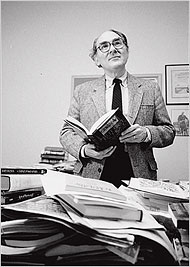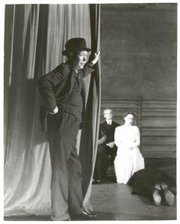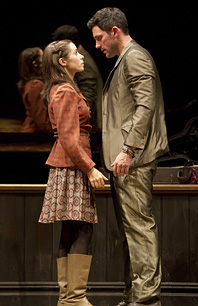 Hilton Kramer, who died today after a long and debilitating illness, was a great art critic who also founded an important magazine, The New Criterion. He was, like so many other great critics, more than a little bit narrow in his enthusiasms, but whenever he wrote about the artists who engaged his sensibilities most powerfully, he never failed to be illuminating.
Hilton Kramer, who died today after a long and debilitating illness, was a great art critic who also founded an important magazine, The New Criterion. He was, like so many other great critics, more than a little bit narrow in his enthusiasms, but whenever he wrote about the artists who engaged his sensibilities most powerfully, he never failed to be illuminating.
I last had occasion to write about Hilton in 2007, when he brought out his final book, The Triumph of Modernism: The Art World, 1985-2005:
Kramer is best known for his unfavorable reviews, and in recent years he has spent an ever-increasing share of his time commenting on politics. As a result, too many younger readers are unaware that he is one of the best critical advocates we have. I saw several of the shows reviewed in The Triumph of Modernism when I was first starting to take a serious interest in art, and I vividly remember how reading what Kramer had to say about such critically undervalued modern painters as Fairfield Porter, Arthur Dove and Richard Diebenkorn helped give shape to my inchoate excitement. For all his gifts as a demolition man, it is this aspect of his work that continues to mean the most to me. Nothing is harder to write than a good review, and nobody writes better ones than Hilton Kramer.
John Podhoretz, who has written well about Hilton’s political passions, portrays him as a difficult man who was hard to like. For my part, I found him so intimidating that it was impossible for me to get to know him more than superficially. I regret that, but I am proud both to have known Hilton at all and to have published in The New Criterion. He was a man of the highest possible seriousness, forthright and fearless, and I expect that he will not soon be forgotten.
UPDATE: The New York Times obituary is here.
Franklin Einspruch gets Kramer exactly right.

 From 2005:
From 2005: My brother and sister-in-law are moving into my mother’s house in Smalltown, U.S.A. It was built a half-century ago and is in need of much repair, so Dave has set about remodeling the place, starting with what used to be my bedroom. Though he undertook the task with my wholehearted approval, it was still a jolt when I stopped by the house, opened the door to my old room, and found…nothing. The bed I’d slept in, the bookshelf that once held my burgeoning library of paperbacks, the chest of drawers in which I placed my neatly folded clothes–all had vanished. Even the carpet was gone.
My brother and sister-in-law are moving into my mother’s house in Smalltown, U.S.A. It was built a half-century ago and is in need of much repair, so Dave has set about remodeling the place, starting with what used to be my bedroom. Though he undertook the task with my wholehearted approval, it was still a jolt when I stopped by the house, opened the door to my old room, and found…nothing. The bed I’d slept in, the bookshelf that once held my burgeoning library of paperbacks, the chest of drawers in which I placed my neatly folded clothes–all had vanished. Even the carpet was gone. Not surprisingly, opening the door to my bare room-that-once-was put me in mind of the last act of Our Town, in which the Stage Manager permits Emily to pay a spectral visit to the Grover’s Corners of her childhood. It felt as though I had turned that scene upside down, with the Stage Manager pulling back the curtain to reveal an empty stage.
Not surprisingly, opening the door to my bare room-that-once-was put me in mind of the last act of Our Town, in which the Stage Manager permits Emily to pay a spectral visit to the Grover’s Corners of her childhood. It felt as though I had turned that scene upside down, with the Stage Manager pulling back the curtain to reveal an empty stage. Never mind all that. Go anyway.
Never mind all that. Go anyway.